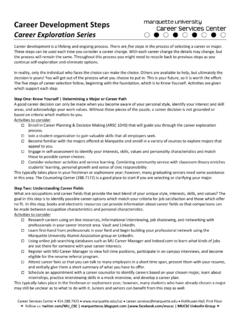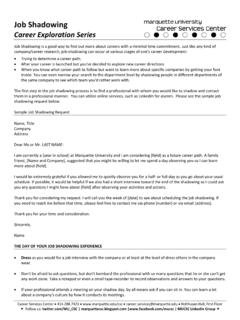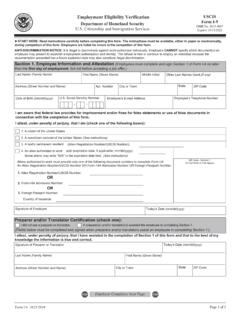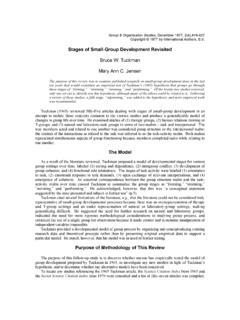Transcription of Group Therapy Participation Agreement - Marquette …
1 Group Therapy Participation Agreement Group Therapy is often the treatment of choice for people who experience troubled relationships, loneliness, depression, anxiety, grief/loss, and low self-esteem. People who participate in Group Therapy have the opportunity to benefit from sharing personal experiences, giving and receiving supportive and constructive feedback, and experimenting with new interpersonal behaviors. In order for Group to work, a safe environment must be created, and expectations for members and co-leaders must be understood by the participants. To ensure a safe environment for personal growth it is recommended that all participants agree to the following guidelines.
2 I. Confidentiality Sharing in Group can be anxiety-provoking; therefore we ask that you keep all information discussed in this Group confidential. This request means that you may not discuss the identity or identifying information, or share the reactions of any member of this Group with anyone outside of the Group . You may talk about your own personal reactions, and are even encouraged to do so outside of Group , but not about others identifying information or reactions. If you are engaged in services with a provider in the community for mental health concerns, we will require a release of information so that we may coordinate your care ( , discuss appropriateness of Group as a treatment option, update provider about your progress, concerns about your safety, and termination of services).
3 It is your responsibility to inform the Group leader of any change in your treatment, ( taking medication, stopping individual Therapy , or changing individual therapists). Exceptions to confidentiality with regard to your therapist(s) still hold: imminent danger to self and/or others, child/elder abuse, subpoenaed records, and threat to national security. State law requires that all MUCC providers, as employees of the University, report the total number of students seen who report that they have been sexually assaulted to the University without identifying information. II. Attendance Group members are expected to make a commitment to attend Group for the entire semester.
4 Members are also expected to arrive for the Group on time every week. Group will always start on time. If you are running late or have an emergency/illness that prohibits you from coming to Group , we ask that you call one of the co-leaders. If you know ahead of time that you will miss a later Group session, we ask that you share the date of your absence with the Group beforehand. Group will also always end on time, no matter what is being discussed. Weekly attendance will allow everyone to continue the discussion. Members often feel anxious about participating in groups, and seeing the results can take time.
5 Although the expectation is to complete the Group experience, in the event you decide not to continue and have explored your concerns with the leaders and other members, we ask that you come back to the Group to say goodbye. Though perhaps hard to imagine, members begin to care about one another and will feel unresolved if you leave without explanation. III. Relationships with Other Members Group is not a place to make social friends, and if you use it this way, you may not experience the intended benefits. Group is an opportunity to have therapeutic relationships in which you learn more about yourself and the ways in which you relate to others.
6 You may have strong feelings toward some members of the Group , as you do with people in your life. However, Group can be a safe environment to explore those feelings and the way you act on them. If you do have contact with someone outside of Group ( , see someone on campus), we ask that you share that contact with the Group at the next meeting. IV. Active Participation Members are not required to talk in Group , but we know that the more you put in, the more benefits you will receive. The only time we ask that you do speak is when a new member is added to the Group and introductions and goals for Group are shared.
7 We will encourage you to talk honestly about your feelings as opposed to sharing details of stories. We will ask you to do this because not everyone can relate to a life experience, but everyone can understand feelings ( , fear, happiness, anger). We realize that asking you to focus on your feelings can be difficult or frustrating at times. However, part of the challenge and benefit of Group is to learn new ways of making deeper connections with others. V. Respect for Human Dignity and Diversity No Group member is ever to be humiliated, hazed, or abused in any way. By signing this and joining Group , I agree to avoid this destructive behavior.
8 We encourage members engage in active listening, with the aim of listening for deep understanding as opposed to listening to respond. We will respect others differences, beliefs, cultures, sexual identities, and all other forms of intersecting identities that comprise who we are as unique individuals and as members of various groups. Rather than re-capitulating a culture of silence, in Group we strive to recognize and acknowledge the impact of stereotypes, prejudice, discrimination, oppression, power and privilege as they surface both inside and outside of the Group environment. We, as facilitators, strive to meet our commitment to our campus community to embrace and celebrate diversity in all its richness, and invest in creating a community based on mutual respect, understanding and openness.
9 As a part of Group , we expect that we will support each other in the process of self-exploration around issues of diversity and other personal difficulties, challenging our own biases and engaging in courageous dialogues for growth. _____ _____ Signature Date _____ _____ Printed Name Student ID _____ _____ Parent/Guardian Signature (for minor clients) Date _____ _____ Signature of Leader Date _____ _____ Signature of Leader Date Marquette University Counseling Services Holthusen Hall Room 204 PO Box 1881 Milwaukee WI 53210-1881


















